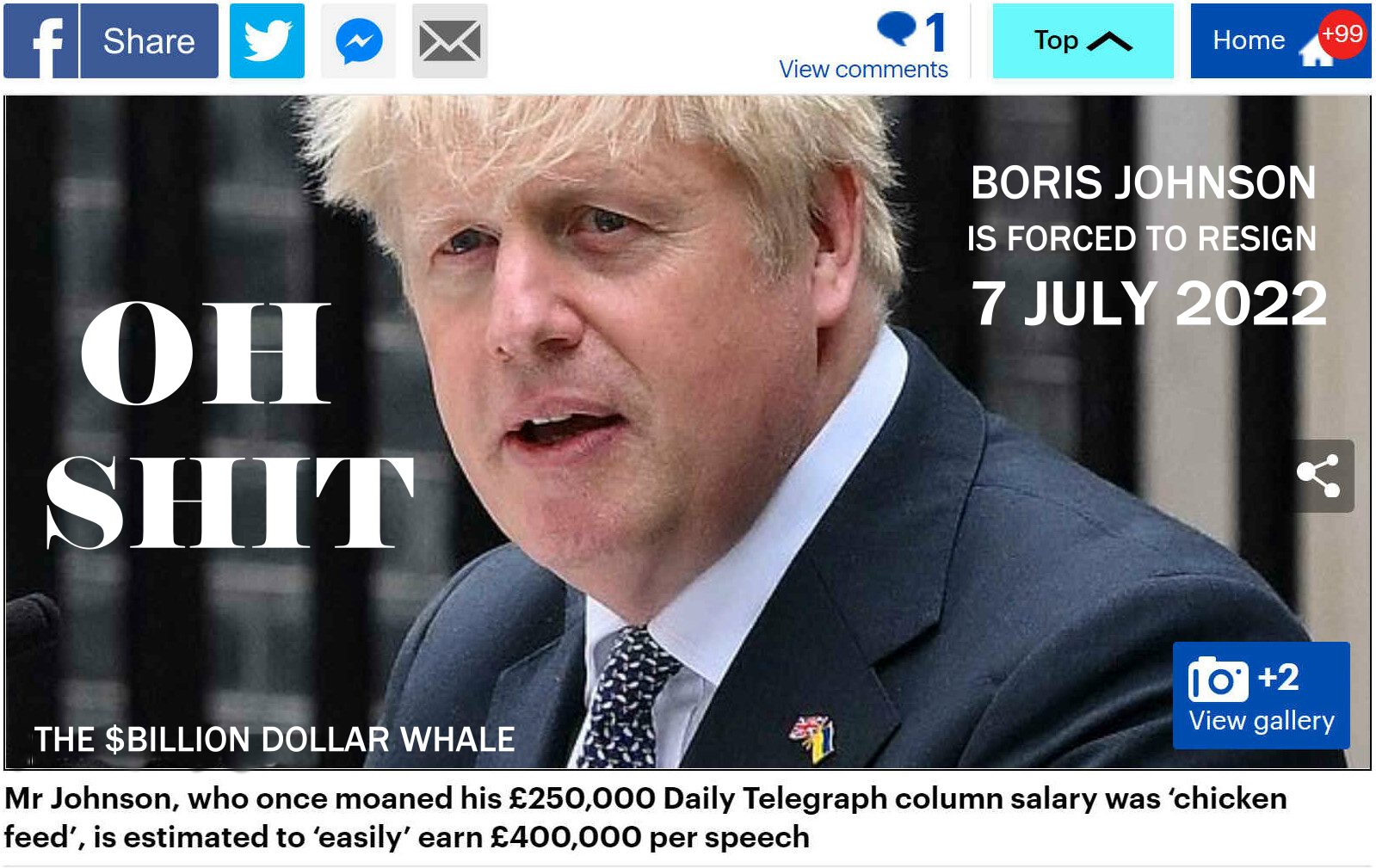
IT'S
A FAIR COP GOV - The
UK could not afford any more of his bungling antics. He's cost
us £billions, and the sad part is he likely to profit from his
negligence. He halved the value of pensioner's savings and
failed to deliver Brexit - despite claiming otherwise. In a true
democracy, he should have gone lone ago, when caught out lying
over proroguing parliament perhaps, but for sure after partygate.
"This Johnson resignation just means more uncertainty for us Europeans. More UK inward-looking obsession with its own domestic dramas, rather than looking outwards towards partners abroad," grumbled one particularly fed-up EU diplomat who spent years working on Brexit.
"And all this, with war back here on our continent," he added. "The UK needs to get a grip."
SKY NEWS 8 JULY 2022 - Unlike previous PM's ousted by their party, Boris Johnson is leaving in disgrace
Johnson is leaving in disgrace because of flaws in his personality and behaviour, as scores of ministers complained in their resignation letters.
The ousting of this prime minister was different.
Unlike Margaret
Thatcher, Tony Blair or
Theresa May, who were all also removed from office by their parties rather than the electorate, Boris Johnson could not leave with his head held high.
He has not been forced out by differences over policy or outstaying his welcome.
Johnson is leaving in disgrace because of flaws in his personality and behaviour, as scores of ministers complained in their resignation letters.
In the words of Brandon Lewis, the first nail in his political coffin on the final day: "A decent and responsible government relies on honesty, integrity and mutual respect. It is a matter of profound personal regret for me that I must leave government as I no longer believe those values are being upheld."
Nor was it a clean break.
The Johnson era is not quite over. He fought calls to step down beyond the point of decency which was respected by his predecessors.
Finally thwarted by the mass of his ministers and MPs turning away from him, he has still not left the scene. He is clinging on messily as a caretaker.
To many such lingering seems inappropriate. He is leaving in disgrace rather than with a gold watch, pats on the back and a quiver of "Sorry You're Leaving Cards".
No sign of him going quietly
He could yet be forced to go sooner and to hand over to a genuine stopgap, most likely the Deputy Prime Minister
Dominic Raab who has ruled himself from standing for the top job.
If he won't go quietly in the next few days - and there is no sign that he will - Tory MPs are already speeding up the election process so he sticks around for the shortest time possible.
He told his new cabinet that he would not take big decisions during the interregnum but his party knows well how little his word is worth.
Thatcher and Blair left promptly when their time was up.
That was the way the Tories did things back then. MPs alone chose the leader without a democratising vote of the membership.
Labour engineered a one-horse race for Gordon
Brown.
Both bowed to the mood against them while seemingly still in their pomp. Thatcher went despite winning the first round of her leadership challenge, the 1989 version of a vote of confidence.
Blair quit after a handful of junior Brownite ministers resigned, tiny in comparison to the 60 protest resignations Johnson tried to defy.
Six months after winning her vote of confidence, May gave up when it became clear that she could no longer get legislation through parliament.
I witnessed these departures as they happened. Although sticking rigidly to my broadcaster's impartiality, I admit I was moved and felt some sympathy for each of the protagonists.
They had climbed high and tried so hard to serve their country and now they were being dumped. The atmosphere was charged perhaps because the spectacle was so final.
May gave up "the honour of my life", fighting sobs at the Downing Street lectern.
Thatcher's farewell outside Number 10 was a brief 143 words only of throaty thanks. Her tearful eyes as her Daimler sped away for the last time is one of the iconic photographs of her premiership.
Blair left the farewells in Downing Street to his wife's cheeky "Goodbye, I don't think we'll miss you" to the assembled media.
For his envoi he opted for reflection and humour at Trimdon Labour Club and in parliament. Choosing to deliver his last words as prime minister to MPs, he earned applause and a standing ovation across the chamber after admitting he had never been "a
House of Commons
man".
No offer of an apology
Johnson's departure was devoid of emotion - both for him and for spectators. The small gaggle of supporters and dependents hastily rustled up to applaud him held back their cheers and tears. Journalists had to be briefed afterwards that there had been some weeping behind the front door.
Johnson's speech was unreflective and offered no apology for his behaviour. There was no mention of the "three Ps" - Owen Patterson, Partygate and Chris Pincher - which precipitated his downfall in the past 12 months.
President-like, he continued to talk about the "mandate" he believed he won personally in 2019 in the UK's parliamentary constituency electoral system.
Remarkable resilience
He described his colleagues' decision to "change government" as "eccentric" and blamed the powerful "herd instinct" in Westminster. He thanked the staff at his grace-and-favour holiday home Chequers before those working for him in Downing Street.
Johnson balanced "how sad I am to be giving up the best job in the world" with the throwaway colloquialism "them's the breaks".
Back inside Number 10 he posed for one of his taxpayer funded official photographers with his wife and his two youngest children, for a loving picture which duly appeared on the front page of many of the next day's papers.
His remarkable resilience betrayed no hint that he had been chastened by being forced out.
Even though it was a resignation speech, he never used the word "resign". He has not resigned yet. In the final hours before his public concession speech he appointed a new cabinet to tide him through the transition period, deliberately excluding those with government experience who had resigned to force him out.
Plans to stay on as MP
For now, Boris Johnson has outsmarted the parliamentary party which wants rid of him. That is likely to last for no more than a matter of weeks until 5 September when parliament returns from the summer recess and the Conservative Party is due to announce a new leader.
After he has been replaced as prime minister, his aides briefed that he plans to stay on as an MP, like May.
He may simply be trapped until the next General Election. Current opinion polls suggest Uxbridge would be another Conservative byelection loss, to go with Shropshire, Tiverton and Wakefield were it to be contested now.
Unlike Thatcher or Blair, he did not leave the impression that he knows this really is "the end", as Blair put of his active political career.
Johnson has gone on to great things out of disasters so many times in the past, he is still not admitting categorically that this time it is over.
Survival has always mattered more to him than honesty, integrity and mutual respect. That is his greatest difference from those recent prime ministerial predecessors who have also been dispensed with by their parties.
By Adam Boulton
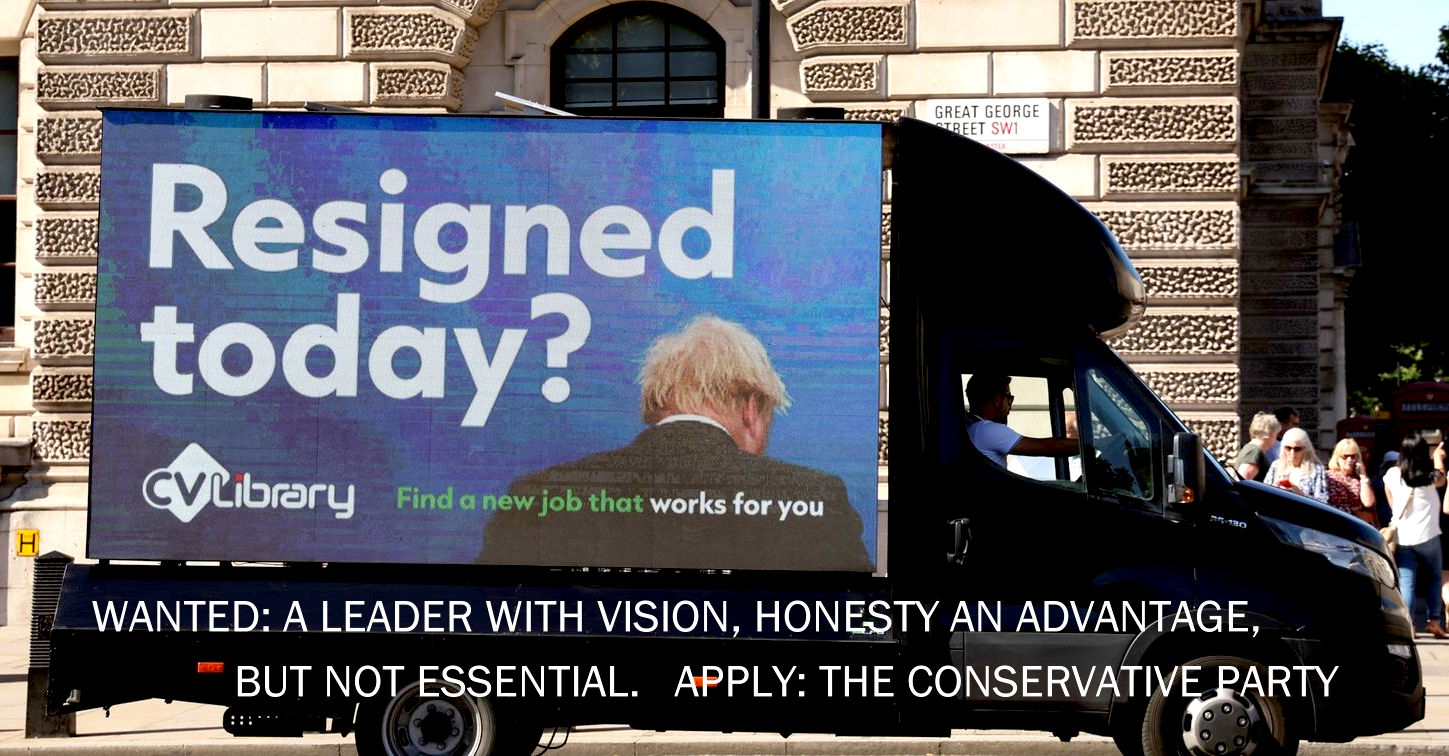
JOBCENTRE - A
career in British politics involves a great deal of lying. Or,
keeping quiet when an honest person would be compelled to speak.
Conservative policies are turning our once green and pleasant
land, into a congested scrum for profits over decency. We need
to be food and energy assured. We need rules that prevent
members of parliament from having 2nd jobs while in office. With
limits on publication after their term is over. They do this
with criminals. As many politicians are white collar criminals,
the same rules should apply. They should not be able to profit
from crime.
DAILY MAIL 7 JULY 2020
- ‘Billion Dollar Boris? PM is set to net a fortune after he leaves office... with experts saying his earning power could 'eclipse Tony Blair's £10million a year'
- Boris Johnson is estimated to 'easily' earn £400,000 a speech as a former PM
- PR guru believes he could land a lucrative deal with the likes of Fox in America
- He may also have time to pen long delayed biography of William Shakespeare
Mr Johnson could become ‘Billion Dollar Boris’ if he plays his cards right with book deals, broadcast slots and speech circuits.
Experts say he will ‘eclipse Tony Blair’ and could net double the estimated £10million a year the former Labour leader made from speeches after office.
Mr Johnson, who once moaned his £250,000 Daily Telegraph column salary was ‘chicken feed’, is estimated to ‘easily’ earn £400,000 per speech while his memoirs could sell for ‘at least’ £1million. He may also now have time to pen his long delayed biography of William Shakespeare.
Mr Johnson signed a deal for Shakespeare: The Riddle of Genius in mid-2015 for a reported £500,000 advance. But publishers Hodder & Stoughton told the Guardian last year that it had not scheduled the book to be published ‘for the foreseeable future’.
PR guru Mark Borkowski said: ‘Boris is fairly wise and over the next 25 years if he can continue to grow it’s going to be Billion Dollar Boris. He’s a global brand, and with the right management, this is beyond speech-making.’
In Mr Johnson’s backbench days, he was earning about £830,000 for newspaper columns, books, speeches and TV appearances.
As PM he was in the top 1 per cent of earners taking home £155,367 – but he could earn double that with one 20-minute speech.
While he is likely to be offered his Telegraph column back, Mr Borkowski believes he could land a lucrative deal with the likes of Fox in America.
‘He is going to eclipse Tony Blair. The guy understands entertainment, he understands celebrity, and to put those two powerful things together with the right sort of team he’s going to be a big attraction. People want to know about the last days of Boris,’ he said.
‘His memoirs could easily make £1million. I would have thought there was a queue of agents in America who want him.’
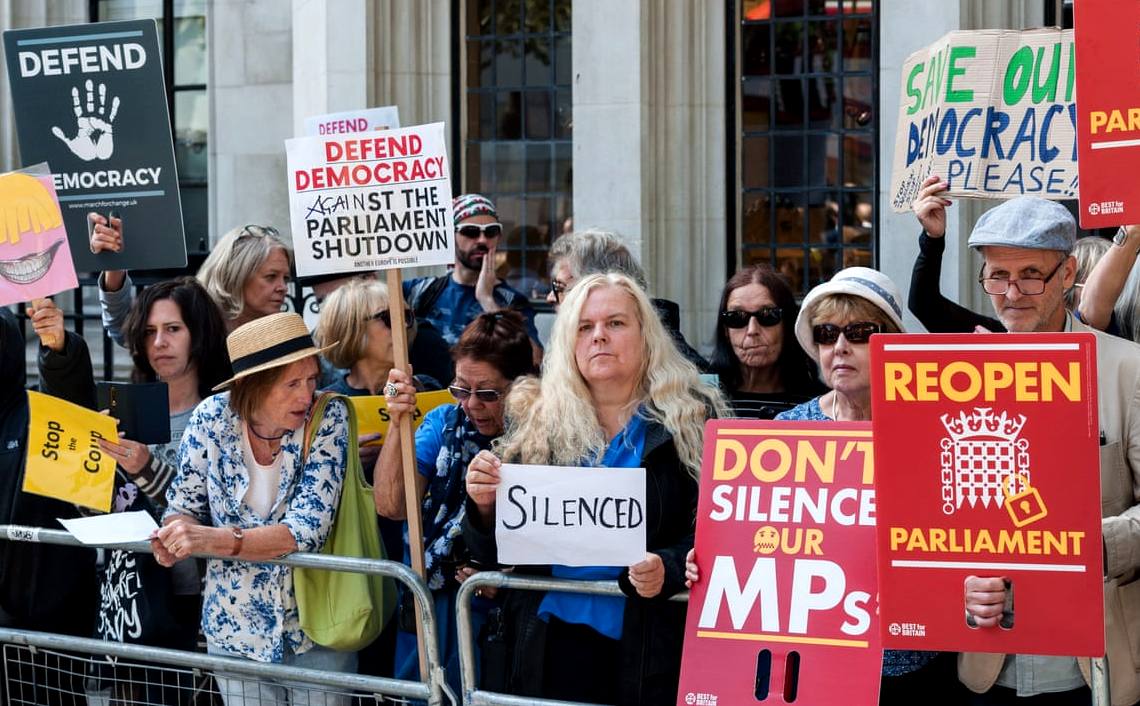
BBC NEWS 7 JULY 2022 - BORIS JOHNSON: THE PRIME MINISTER WHO BROKE ALL THE RULES
Boris Johnson has defied the normal rules of politics for so long, it is hard to believe he is actually going.
Scandals that would have sunk other politicians appeared to have no effect on him. He was always able to bounce back. His gaffes and blunders became part of his brand.
In an age of boring, machine-like politicians, he was seen as a "character", his unruly mop of blond hair and bumbling persona instantly recognisable even to those with no interest in politics. His fun-loving, relentlessly upbeat image, allied to formidable campaigning skills, helped him reach parts of the electorate more conventional Conservatives could not.
He won two terms as mayor of London, normally a Labour stronghold, and helped convince millions to back Brexit in the 2016 EU referendum.
He became prime minister in July 2019 without an election - but four months later secured an historic landslide victory, winning seats in parts of the country that had never voted Conservative before. As 2020 dawned, his dominance of British politics appeared to be complete. But then came coronavirus.
A global pandemic would have tested any leader and Johnson's government made its share of mistakes, with the UK at one point having the highest death rate in the developed world.
But, in the end, it was not his handling of coronavirus that led to his downfall. It was, rather, questions about his character and fitness for high office.
To some long-time observers of Johnson's career, this did not come as a surprise. In an article for the Observer, his former boss at the Daily Telegraph, Sir Max Hastings predicted that a Johnson premiership would "almost certainly reveal a contempt for rules, precedent, order and stability".
From his earliest days, Alexander Boris de Pfeffel Johnson had a tendency to believe rules were for other people.
"Boris sometimes seems affronted when criticised for what amounts to a gross failure of responsibility," his teacher Martin Hammond wrote of the 17-year-old Boris. "I think he honestly believes it is churlish of us not to regard him as an exception, one who should be free of the network of obligation which binds everyone else."
His unwavering self-belief, however, left an impression.
"Boris's charisma even then was off the charts, so funny, warm, charming, self-deprecating," Simon Veksner, a school friend, told author Simon Kuper in his recent book Chums.
He won a scholarship to Eton, arguably England's most prestigious private school, where he discovered a love of Classics and began developing the persona that would become so familiar in his later life.
Oxford University followed, where he achieved his ambition of becoming president of the union - a debating society dating back to 1823, and the time-honoured training ground for Conservative politicians. He also joined the infamous Bullingdon Club, known for the rowdy, drunken behaviour of its members, which included future prime minister David Cameron.
He left Oxford and was taken on as a trainee reporter at the Times newspaper, but lost his job after falsifying a quote - an incident he would later describe as his "biggest cock-up". It proved to be a minor setback however, and in 1988 he was given work by then-editor of the Daily Telegraph, Max Hastings.
As the Telegraph's Brussels correspondent, Johnson set about ridiculing regulations passed by the European Commission - although many of his fellow reporters in Brussels felt his stories were exaggerated and in some cases simply untrue. It was, he told the BBC's Desert Island Discs in 2005, like "chucking these rocks over the garden wall - and hearing an amazing crash next door in England. Everything I wrote in Brussels was having this explosive effect on the Conservative Party - it really gave me this rather weird sense of power".
Disaster loomed again, however, when a recording surfaced of a telephone call between Johnson and his old Oxford friend, Darius Guppy, who had been demanding the private address of a News of the World journalist.
The tape suggested Johnson had agreed to supply the details, even though Guppy, who was later jailed for fraud, had indicated he had wanted to have the reporter, who had been investigating his affairs, beaten up.
Hastings confronted him about the recording, which had been sent anonymously to the Telegraph, but after an apology, with Johnson deploying, in Hastings' words, "all of his self-parodying skills as a waffler", he was sent back to Brussels with a rebuke.
'Sorry, Liverpool'
In 1999, he became editor of influential right-wing magazine the Spectator, and two years later finally achieved his ambition to enter Parliament.
With the Tories languishing in opposition, then-leader Michael Howard was keen to harness the star power of the new MP for Henley, in Oxfordshire.
But Mr Johnson's career as a frontbencher was short-lived.
In 2004, Mr Howard ordered him to Liverpool to apologise to the entire city over a Spectator article that had attributed some of the blame for the Hillsborough disaster on the behaviour of the city's football fans. He survived "Operation Scouse Grovel", as he dubbed it, only to be sacked by Howard a month later for lying about claims he had had an affair with journalist Petronella Wyatt.
Within a year he was back on the frontbench, under new Tory leader David Cameron. But he was increasingly seen as comedian and TV personality, rather than a serious candidate for power.
He had to wait until 2007 to get a chance to move up the ladder, when a somewhat trepidatious Cameron selected him as the Conservative candidate for London mayor. Johnson surprised everybody by storming to victory over Labour's Ken Livingstone, who had looked unbeatable, and winning again four years later.
As mayor, Mr Johnson scrapped the unpopular "bendy buses", implemented a bike hire scheme (colloquially known to Londoners as "Boris bikes") and oversaw arrangements for the 2012 London Olympics - leading to one of the more infamous images of his political career, as he dangled from a zip wire gamely waving a pair of union flags.
In early 2016, he returned to Parliament as MP for Uxbridge and South Ruislip, with his sights set on the top job, and a major dilemma. David Cameron's decision to hold an EU referendum was a defining moment for the country, but also for the old friends and rivals.
Johnson's decision - after much agonising - to join forces with the pro-Brexit campaign came as a severe blow to Cameron's hopes of keeping the UK in the EU. But it was seen as a game-changing moment by the pro-Brexit campaign, run by tough-talking strategist Dominic Cummings, a man Cameron had once dismissed as a "career psychopath".
Johnson deployed all of his formidable campaigning skills, although he came in for heavy criticism for the claim - printed on the side of a battlebus - that the UK sent the EU £350m a week, which did not take into account the UK's rebate.
Political assassination
When his side emerged victorious, it was inevitable that Mr Johnson would throw his hat into the ring to replace the outgoing
David Cameron as Conservative leader and prime minister.
However, his campaign was dramatically undermined when colleague and close friend
Michael Gove withdrew support and decided to run for the leadership himself, saying he did not think Johnson was up to the job of prime minister. It was a brutal political assassination, met with dismay by Johnson's supporters.
Not for the first time, he was contemplating the end of his political career. Yet Theresa May, the eventual winner, appointed Johnson as foreign secretary.
His opponents had a field day trawling the archives for past gaffes and indiscretions, which included a 2007 newspaper column describing then US Secretary of State Hillary Clinton as looking like a "sadistic nurse in a mental hospital". He had also been forced to say sorry to Papua New Guinea over a reference to "orgies of
cannibalism and chief-killing" and, going further back, had apologised for using an racial slur when writing about the Queen's tours of Commonwealth countries.
During his tenure at the Foreign Office, Johnson supported a tough line against Russia and expelled 23 diplomats following the poisoning of ex-spy Sergei Skripal. He also attracted criticism when he mistakenly said Nazanin Zaghari-Ratcliffe, the aid worker imprisoned in Iran, had been working as a journalist.
In 2018, he quit the cabinet in protest at Theresa May's Brexit deal, arguing it would lead Britain into "the status of a colony". He returned to his former highly paid job as a columnist for the Daily Telegraph, immediately running into controversy and accusations of Islamophobia after writing that Muslim women wearing burkas "look like letter boxes".
He remained a stern critic of May from the backbenches and, when she was forced to resign, he once again ran to be leader of his party. This time he was successful, building a commanding lead, not only with Conservative party members - with whom he had always been popular - but, critically, with Tory MPs.
His first few months in the role proved to be rocky as he struggled to govern with his party's at first tiny, then non-existent majority in the House of Commons.
He recruited Dominic Cummings - regarded with suspicion and seen as a troublemaker by many Conservatives - as his closest Downing Street aide. At Cummings' behest, he fought a guerrilla war against those MPs seeking to block his Brexit strategy, including some high-profile members of his own party.
'Get Brexit Done'
In an audacious and highly controversial move, later ruled unlawful by the Supreme Court, he attempted to prorogue, or suspend, Parliament, after his attempts to push through a Brexit deal faltered ahead of his own deadline of 31 October 2019.
After two failed attempts to get MPs to vote for a general election, he finally went to the country in December 2019, promising to "Get Brexit Done", a slogan dreamed up by Cummings.
The gamble paid off, and he was returned to power with the biggest Conservative majority since
Margaret
Thatcher's 1980s heyday. His Brexit deal was approved and on 31 January 2020 the UK left the EU.
It looked as though negotiating a trade deal with the EU would be his government's first key task - and Brexit his abiding legacy. But, within weeks, he was engulfed by an all-consuming crisis that few - least of all Mr Johnson - had seen coming: the coronavirus pandemic.
In a dramatic televised statement, he announced a national lockdown, a move unprecedented in peace time. The self-proclaimed libertarian and champion of the free market was now ordering the nation to stay in their homes, shutting down of huge of swathes of the UK economy and promising to spend billions on subsidising the wages of furloughed workers.
In April 2020, Johnson tested positive for Covid himself and spent three nights in intensive care. Downing Street played down the seriousness of his condition but when he was discharged, the PM admitted "it could have gone either way".
Less than three weeks later, his fiancee Carrie Symonds gave birth to their first child, named Wilfred Lawrie Nicholas Johnson - Nicholas in a tribute to the doctors who had treated him in hospital.
The twice-divorced prime minister married Ms Symonds at Westminster Cathedral at the end of May 2020. Their daughter Romy was born in December 2021.
Ms Symonds was a well-connected figure behind the scenes in the Conservative Party and her influence came to be resented by Mr Cummings and his close-knit team of former Vote Leave officials, who were now at the heart of the Downing Street machine.
As the UK emerged from the pandemic, Mr Johnson hailed the success of the UK's vaccine roll-out, which was the fastest in the developed world, helping the UK economy to re-open earlier than most. The mass unemployment predicted by many had also been avoided.
But his political problems were beginning to mount up.
Back in May 2020, he had stood by Dominic Cummings when he came under fire over a lockdown-busting trip to County Durham.
But Mr Cummings was forced out of Downing Street at the end of that year after losing a power struggle with Carrie Symonds, and now appeared determined to remove him from office. In an explosive appearance before a select committee, Mr Cummings said Mr Johnson was "unfit for the job" of prime minister, and that thousands of people had died needlessly because he had delayed lockdowns and ignored scientific advice.
Johnson was also under investigation over an expensive designer revamp of the Downing Street flat where he lived with his family, which was initially paid for by a Conservative donor. He was ultimately cleared by his ethics adviser, Lord Geidt, but the peer later rebuked his boss for having "insufficient" respect for his role, after new information came to light that had not been revealed to his inquiry. Lord Geidt would later quit the role in exasperation at the prime minister's attitude to ministerial standards.
Mr Johnson's political opponents, who had been unable to lay a glove on him at the height of the pandemic, were now making hay with accusations of sleaze and cronyism, and a prime minister with an apparently cavalier disregard for long-established rules of behaviour. This impression was not helped by Johnson's attempt to rewrite the disciplinary code for MPs to help his ally Owen Paterson, who was facing suspension for breaking lobbying rules. Johnson later confessed this had been a "total mistake".
But worse was to come in November 2021, when the Labour-supporting Daily Mirror accused Johnson of breaking Covid rules by attending parties in Downing Street when indoor mixing was banned. There was a further bombshell just over a week later when video footage emerged of Downing Street staff laughing and joking about holding a Christmas party.
Then the Daily Telegraph revealed that Downing Street staff had held booze-fuelled parties the night before the
Duke of
Edinburgh's funeral. Johnson later apologised to the Queen.
Johnson, his then-Chancellor Rishi Sunak and Carrie Johnson were among those fined by police over lockdown parties, while a damning report by senior civil servant Sue Gray laid bare a Downing Street culture of drunkenness and contempt for the rules.
Johnson did his best to sound contrite in public, telling MPs he had learned lessons and had launched a shake-up of backroom staff, but he continued to insist that he had not broken Covid rules on purpose.
He faced an investigation by a Commons committee into whether he had misled Parliament with his initial claims that there had been no parties in Downing Street.
The cabinet rallied round the prime minister, but a steadily growing band of backbench Conservatives, from different wings of the party had come to the conclusion that he had to go, amid rising public anger. Booing was heard when Johnson and his wife arrived for the Platinum Jubilee thanksgiving service at St Paul's Cathedral.
He survived a confidence motion in June 2022, despite 41% of his MPs voting against him. But a string of by-election defeats led MPs to fear he had become an electoral liability. The old magic, it seemed, was no longer working.
The final straw for many MPs was when ministers were sent out to defend the prime minister in a row over an MP facing allegations of
sexual
misconduct, armed with misleading information from Downing Street.
A mass walkout by ministers, including Chancellor Rishi
Sunak, followed and after 48 hours of defiance, in which he repeatedly vowed to "get on with the job" of governing, he was finally forced to face up to reality.
The rollercoaster career of a politician who had defied political gravity for nearly four decades has finally come crashing to earth.
By Brian Wheeler
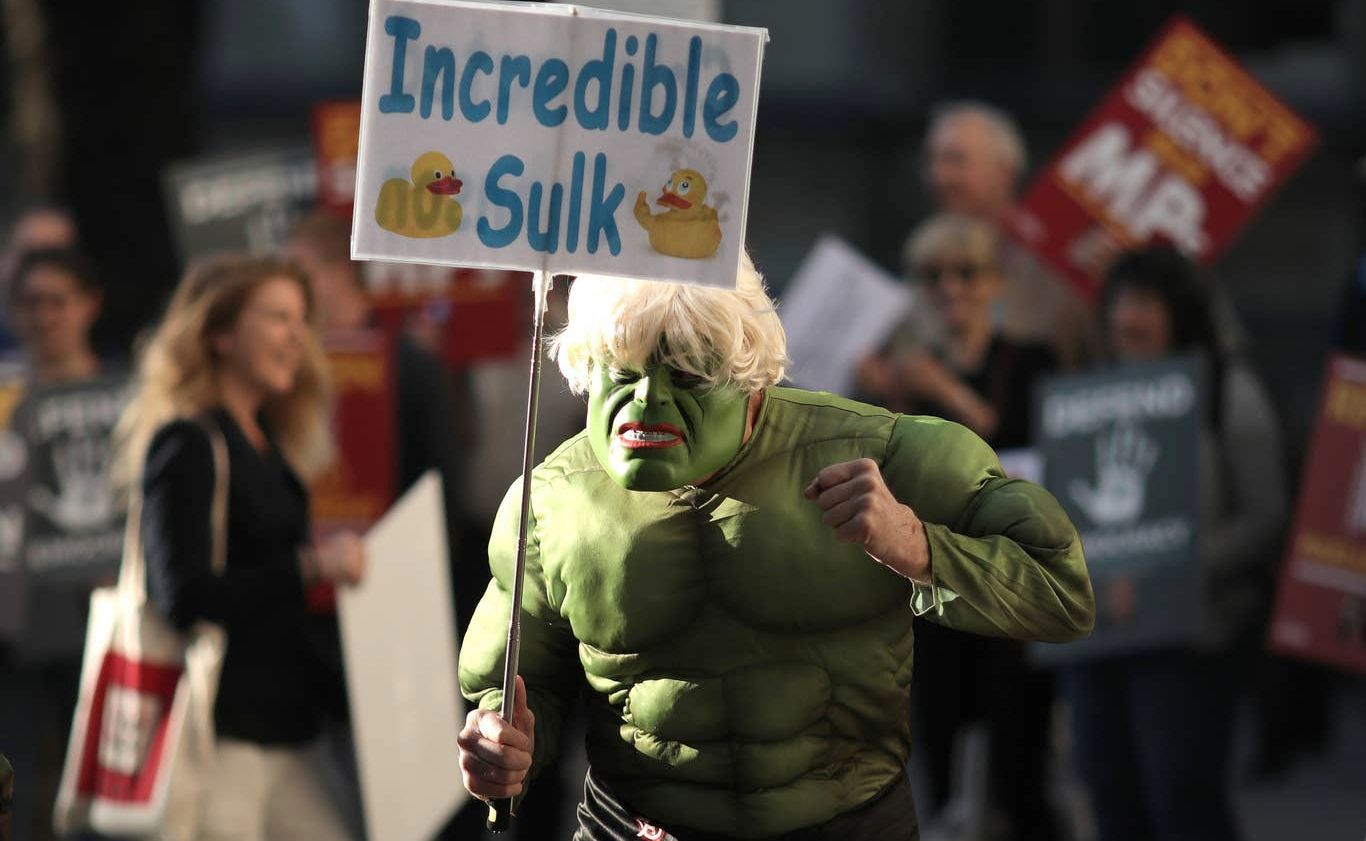
YOU
WOULDN'T LIKE ME ANGRY - "I
don't care what those doddering fools have decided, I'm right and they
are wrong. I'm very reasonable and just the bloke to lead the
country my way. We can't have a little thing like democracy
stand in the way."
The
11 Justices of the UK Supreme Court have unanimously decided
that Parliament was not actually suspended. This is because the
advice of the Prime Minister to the Queen was unlawful and the
advice and the steps which followed were of no legal effect. In
finding as they did, the Justices upheld the earlier ruling by
three appeal judges in the Court of Session in Edinburgh. A
person with high morals would have resigned at this point.
Surely, we need a change in the law to prevent underhanded
candidates from getting their hand on the country. His salary
and subsequent earnings, should be classed as proceeds of crime.
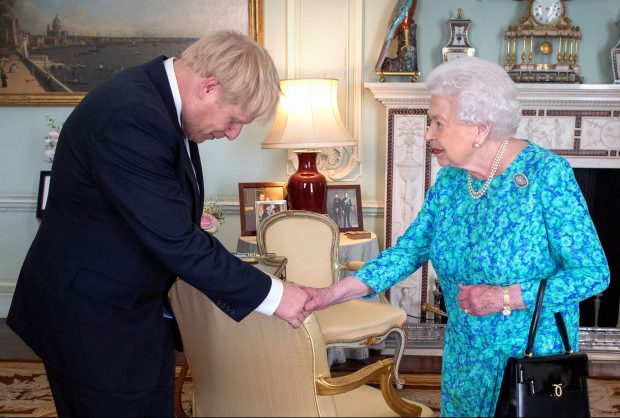
OH
SHIT BORIS - "Yes
Maam, got my well used pecker caught in the zipper this time. Not quite as
big a fiasco as Andrew's big dipper. "I guess the royals have
been rumbled too" "Not to worry, let a few months go
by, with plenty of media brain washing - and we may come through this
- and even make a few bucks."
WHY
CONTACT
BORIS ?
Boris Johnson disgraced MP for Uxbridge and South Ruislip (give it up
man)
36 Harefield Road
Uxbridge,
Middlesex
UB8 1PH
The
Disgraced Prime Minister
No
longer @ 10 Downing
Street
London,
SW1A 2AA
The
Former Prime Minister
House of Commons
London, SW1A 0AA
Let
him know his rhetoric stinks:
boris.johnson.mp@parliament.uk
SOME
FUN CONSERVATIVE
MPS FROM 2017-2018
|
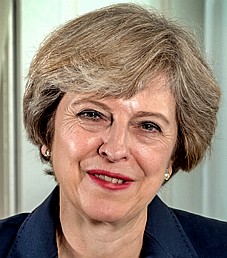
Theresa
May - Prime Mnister
MP
for Maindenhead
|
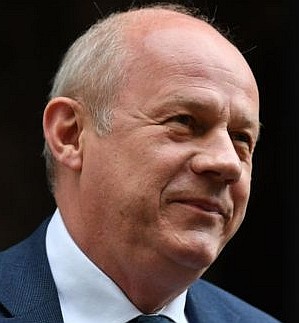
Damian
Green
MP
for Ashford
|

Philip
Hammond
MP
Runnymede & Weybridge
|

Boris
Johnson
MP
Uxbridge & South Ruislip
|
|
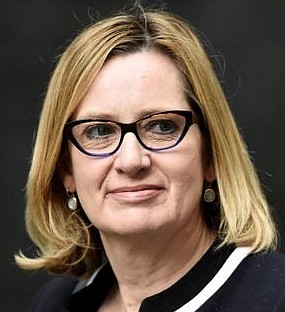
Amber
Rudd
MP
Hastings & Rye
|
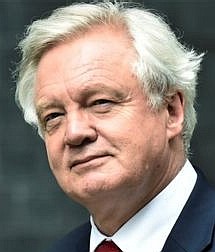
David
Davis
MP
Haltemprice & Howden
|
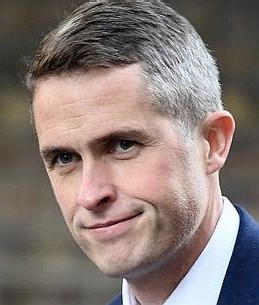
Gavin
Williamson
MP
South Staffordshire
|
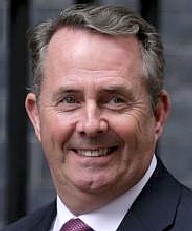
Liam
Fox
MP
North Somerset
|
|
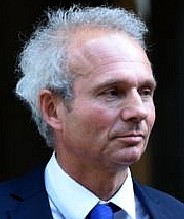
David
Lidlington
MP
for Aylesbury
|
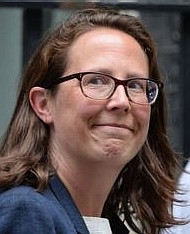
Baroness
Evans
MP
Bowes Park Haringey
|
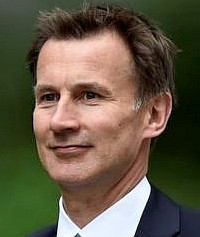
Jeremy
Hunt
MP
South West Surrey
|

Justine
Greening
MP
for Putney
|
|
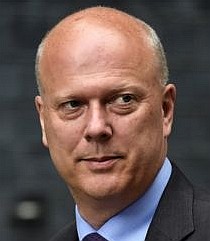
Chris
Grayling
MP
Epsom & Ewell
|
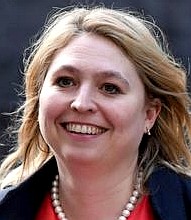
Karen
Bradley
MP
Staffordshire Moorlands
|

Michael
Gove
MP
Surrey Heath
|
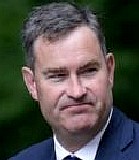
David
Gauke
MP
South West Hertfordshire
|
|
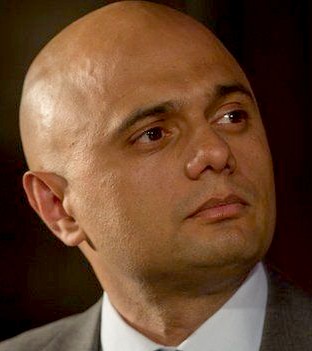
Sajid
Javid
MP
for Bromsgrove
|

James
Brokenshire
MP
Old Bexley & Sidcup
|
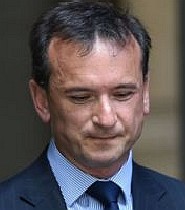
Alun
Cairns
MP
Vale of Glamorgan
|
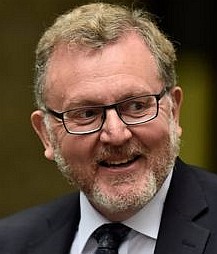
David
Mundell MP
Dumfriesshire
Clydes & Tweeddale
|
|
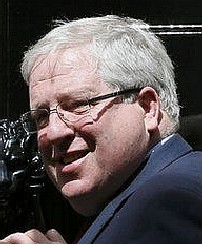
Patrick
McLoughlin
MP Derbyshire
Dales
|
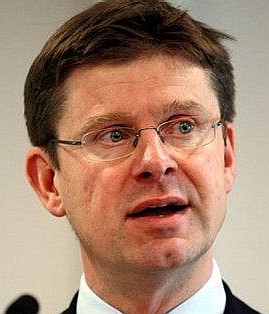
Greg
Clark
MP
Tunbridge Wells
|
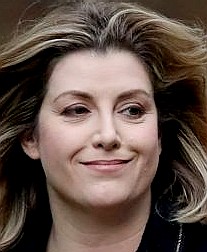
Penny
Mordaunt
MP Portsmouth
North
|

Andrea
Leadsom
MP South Northamptonshire
|
|

Jeremy
Wright
MP
Kenilworth & Southam
|

Liz
Truss
MP
South West Norfolk
|
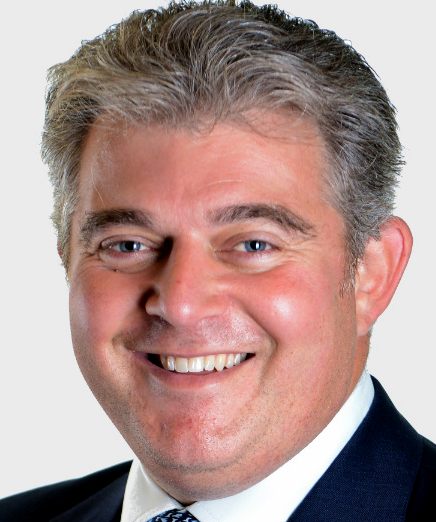
Brandon
Lewis
MP
Great Yarmouth
|
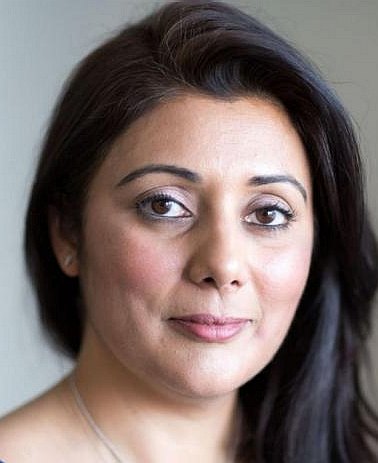
MP
Nus
Ghani
MP
Wealden
|
|
|
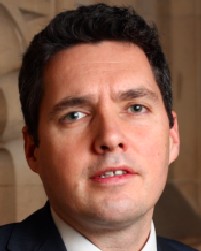
Huw
Merriman
MP
Battle
|
|
MP
|
UK
POLITICS IS AN EXPENSIVE SHAMBLES FOR THE ELECTORATE
AND
THE REST OF THE DEVELOPED WORLD
CONSERVATIVE
PARTY
CO-OPERATIVE
PARTY
DEMOCRAT
UNIONIST PARTY
GREEN
PARTY
LABOUR
PARTY
LIBERAL
DEMOCRATS
PLAID
CYMRU
SCOTTISH
NATIONAL PARTY
SINN
FEIN
SOCIAL
DEMOCRATIC AND LABOUR PARTY
UK
INDEPENDENCE PARTY
ULSTER
UNIONIST PARTY
Conservative
Party
Co-operative
Party
Democratic
Unionist Party
Green
Party
Labour
Party
Liberal
Democrats
Plaid
Cymru
Scottish
National Party
Sinn
Féin
Social
Democratic and Labour Party
UK
Independence Party
Ulster
Unionist Party
































